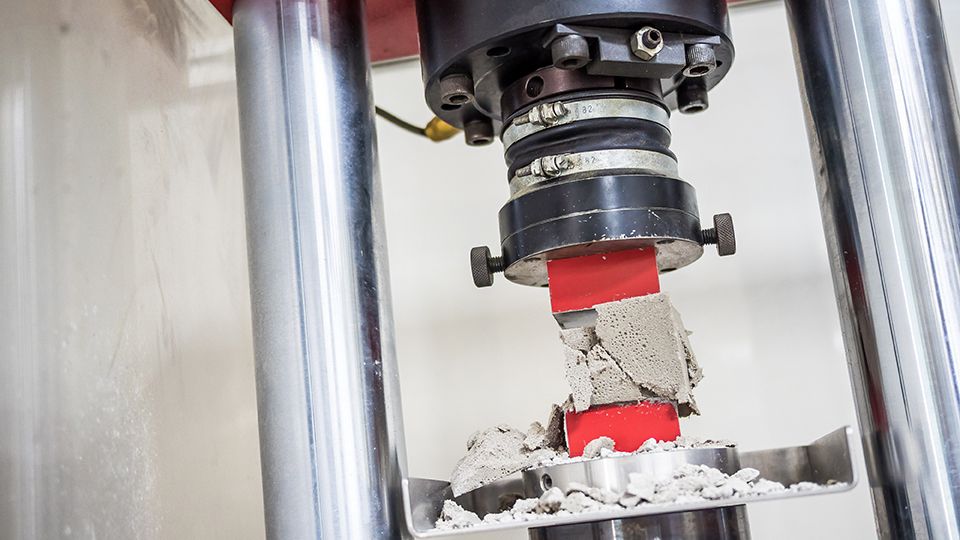
Simulation with Soil and Concrete Models
Foundation and Retaining Wall Analysis in Ansys Mechanical

Select, understand, and apply material models for concrete, reinforced concrete and soils for foundation and retaining wall analysis applications. This training is offered as a 1-day course.
Duration
1 day
Prerequisites
Basic knowledge of Ansys Mechanical
Software used
Ansys Mechanical
- Carrying out working load analyses for reinforced concrete
- Bearing capacity and a settlement analysis with several soil models
- Identifying material parameters and being able to input them correctly
- Mastering efficient control of non-linear computation with several geo-mechanical models
Description
The fields of mechanical and civil engineering are becoming more intertwined due to the increasing complexity of projects in fields such as structural engineering and the energy sector. This higher complexity results in the increasing importance of a realistic description of geo-mechanical materials and concrete in practical applications. To accurately predict both the bearing capacity and soil settlements, a realistic description of geo-mechanical materials and their implementation in Numerical Simulations is needed. Realistic modeling of concrete materials is necessary to optimize the dimensions of concrete foundations or concrete stabilization walls. The actual interaction between concrete and soil must be taken into account for optimal design.
In this course, you will learn how to perform bearing capacity analysis for reinforced concrete and settlement analysis with various soil models. You will recognize material parameters and define them in Ansys Mechanical. Practical exercises enable you to quickly familiarize yourself with foundation modeling. You will acquire the basic knowledge for controlling nonlinear foundation analysis. The training is intended for civil and mechanical engineers working in interdisciplinary teams who want to be able to model the behavior of geo-mechanical materials for product development and construction projects based on realistic computer simulations.
Detailed agenda for this 1-day training
Day 1
01 Initial stress state and elastic behavior of soils
- Stress initialization
- Soil mechanics overview
- Isotropic elasticity
- Porous elasticity (pressure dependency)
- Post-processing
- Demo: Initial stress state
- Exercise: Soil settlement under a loaded elastic Foundation
02 Limit states analysis for foundations and retaining walls
- Perfect plasticity: Mohr-Coulomb
- Solver analysis settings
- Parameter identification
- Earth pressure states
- Best practices and troubleshooting
- Demo: Moveable retaining wall
- Exercise: Dry soil bearing capacity under a vertically loaded foundation
03 Prediction of foundation settlements considering volumetric yielding
- Critical state soil mechanics
- Generalized Cam-Clay model for porous soils (sand or clay)
- Parameter Identification
- Best practices
- Overview of analysis of fully saturated soils
- Demo: Foundation analysis on saturated soil using CPT elements
- Exercise: Dry soil settlement under a vertically loaded foundation
04 Concrete and reinforced concrete
- Modified Drucker-Prager model for concrete
- Menetrey/William model for concrete
- Softening and blurred crack calculation based on homogenization
- Modeling of the reinforcement with Mesh dependent (REINF elements) and Mesh independent (MESH200) methods
- Identifying and inputting material parameters
- Demo: tensile and compression test on a concrete cube
- Exercise: Calculation of a reinforced concrete column
Your Trainers

Dr. sc. Juan Escallòn
Placement in the CADFEM Learning Pathway
Participant data
Additional information
Commentary
Whether eLearning, classroom courses, live online training or customized workshops - together we identify the best option for you.
Do you have questions on the training?
If you book through your university, you will receive a 50% discount on the stated fee on training courses and eLearning courses.
For more information on the validity and how booking with the code ACADEMIC50 works, please visit our page on training for academic users.
Straight after you sign up, an automatic confirmation of receipt will be sent to the email addresses you provided. Once you have successfully verified the data you provided, you will receive your personalized sign-up confirmation, containing further information on course fees, the billing address, etc., by email within two to three working days.
As soon as the minimum number of attendees has been reached, you will receive a final training confirmation containing further information. If you have booked an on-site training, we recommend that you wait until you have received this final confirmation before booking your travel and accommodation.
If the minimum number of attendees is not reached, we reserve the right to cancel the training seven days before it is due to start at the latest. We are happy to inform you on changing your booking to an alternative date. Please note that we accept no liability for hotel or travel bookings that attendees have already made.
Usually the training courses start at 9:00 am and end at 5:00 pm of the respective local time. The actual course times will be stated in the booking confirmation. Please note that, depending on the training host, there may be a possible time shift between your and the provider's local time. Therefore all local times are provided with the valid time shift to Greenwich Mean Time (GMT).




